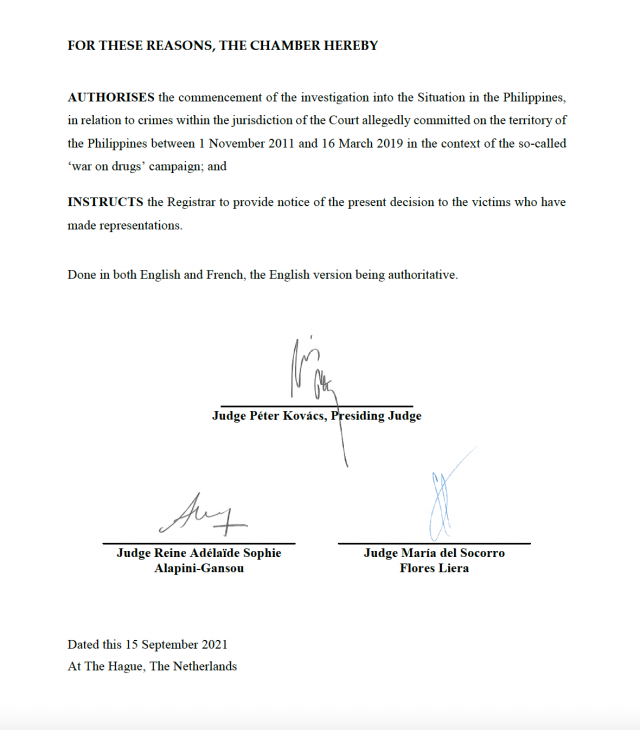ICC opens probe into drug war killings in Philippines
The International Criminal Court on Wednesday authorized the start of its investigation into the killings in the Philippines' war on drugs.
In a statement, the ICC said that its Pre-Trial Chamber 1 has granted then-Prosecutor Fatou Bensouda's June 14 request to probe crimes "allegedly committed on the territory of the Philippines between 1 November 2011 and 16 March 2019 in the context of the so-called 'war on drugs' campaign."
The ICC said that a "specific legal element of crime against humanity of murder" has been met with respect to Duterte's war on drugs in the period from July 1, 2016—the day after President Rodrigo Duterte was sworn into office as chief executive—until March 16, 2019, the day before the Philippines formally exited the Rome Statute, the treaty that established the ICC.
It has also been met "with respect to the killings in the Davao area between 1 November 2011 and 30 June 2016."
"The Chamber emphasized that, based on the facts as they emerge at the present stage and subject to proper investigation and further analysis, the so-called 'war on drugs' campaign cannot be seen as a legitimate law enforcement operation, and the killings neither as legitimate nor as mere excesses in an otherwise legitimate operation. Rather, the available material indicates, to the required standard, that a widespread and systematic attack against the civilian population took place pursuant to or in furtherance of a State policy, within the meaning of Article 7(1) and (2)(a) of the Statute," the ICC added.
Jude Sabio, lawyer for self-confessed "Davao Death Squad" hitman Edgar Matobato, in 2017 filed the first publicly known communication before the ICC against Duterte, citing the “terrifying” and “gruesome” deaths in the Philippines as a result of his administration’s drug war.
In response, Duterte hit back at the ICC, saying that it has no jurisdiction over him and that the Philippines would withdraw from the Rome Statute.
While the Philippines' withdrawal from the Statute took effect on March 17, 2019, the ICC said the court retains jurisdiction with respect to alleged crimes that occurred on the territory of the country while it was a state party, from November 1, 2011 up to and including March 16, 2019.
"While the relevant crimes appear to have continued after this date, the Chamber noted that alleged crimes identified in the Article 15(3) Request are limited to those during the period when the Philippines was a State Party to the Statute and was bound by its provisions," the ICC said.
The pre-trial chamber was composed of Judge Péter Kovács, Presiding Judge, Judge Reine Adélaïde Sophie Alapini-Gansou and Judge María del Socorro Flores Liera.

'You must be crazy'
In June—in the wake of Bensouda's request—Duterte again refused to face the ICC's probe into his drug war, which has killed at least 6,000 individuals by the government's own tally.
"Itong ICC bullshit ito. I will not, why would I defend or face an accusation before white people. You must be crazy. 'Yung colonizers dito they have not atoned for the sins against the countries they have invaded including the Philippines," the president said.
Citing that he is a former prosecutor, Duterte said he can defend himself from a possible investigation into his controversial anti-drug campaign.
"Justice ako, prosecutor ako, of course I can defend myself. Wala akong sinabing na you kill Mr. Santos... I never said that. But I said I will kill you if you destroy my country," he said.
In a public address last year, Duterte expressed his readiness to go to jail if it was his "destiny."
Malacañang has already declared that the ICC will not be able to compel the Philippines to cooperate with the investigation.
Presidential spokesperson Harry Roque said the Duterte administration will never cooperate because the country is no longer a member of the ICC.
Roque also said Duterte is confident that he will not be held liable for crimes against humanity over the drug war killings because the allegations against him are based on hearsay.
Retired ICC judge Raul Pangalangan, however, said that the Rome Statute is clear that the ICC retains jurisdiction even after a state's withdrawal.
The Supreme Court also said that the Philippines is obliged to comply with the investigation.
Justice for victims
Former senator and vocal Duterte critic Antonio Trillanes IV said the approval of the start of the probe into the crimes against humanity cases filed against Duterte is another step closer to attaining justice for the victims of the deadly drug war.
"To the families of the EJK victims, this is another step closer to attaining justice for your loved ones," he said in a tweet.
On the ICC commencement of Investigation:
— Sonny Trillanes IV (@TrillanesSonny) September 15, 2021
To the families of the EJK victims, this is another step closer to attaining Justice for your loved ones.
To duterte and his cohorts, this is another step closer to prison.
Meanwhile, he said the commencement of the investigation means Duterte and his "cohorts" are a "step closer to prison."
Bagong Alyansang Makabayan (Bayan) secretary general Renato Reyes also said the ICC's decision is a "historic moment."
"This is an important step towards justice and accountability. We join the people in the call #DutertePanagutin," he said in a statement. — Ma. Angelica Garcia/BM, GMA News




